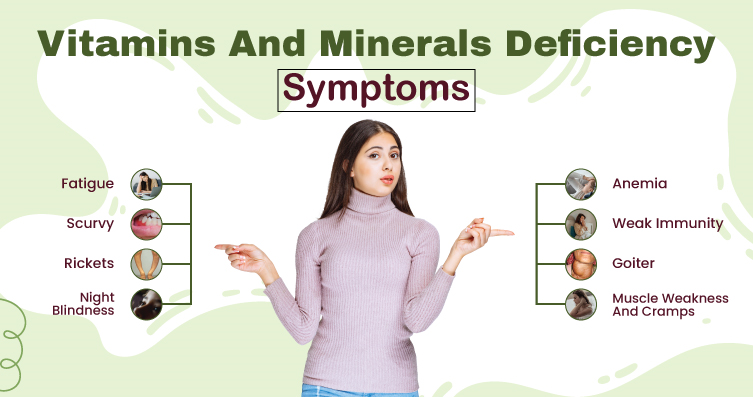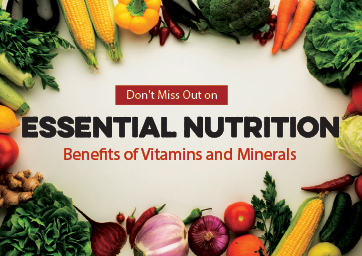Why are Vitamins and Minerals Essential?
Vitamins and minerals are essential nutrients required for our body's proper functioning. They are the building blocks of a healthy life and play a vital role in our body's growth, development, and maintenance.
The benefits of vitamins and minerals are wide-ranging.
They help boost our immune system.
Protect us from disease and illness.
And help build strong bones and teeth.
Vitamins also help to improve skin health, organ function, and energy levels. Minerals play a role in nearly every bodily process. From aiding in digestion to helping regulate blood pressure.
In addition to the many health benefits of vitamins and minerals, they also improve cognitive function. They protect our brains from damage and even help to reduce the risk of Alzheimer's disease.
When it comes to getting the necessary vitamins and minerals, the best way to do so is by eating a balanced diet. Eating a wide variety of nutrient-rich foods can help ensure that your body receives all the essential nutrients. Additionally, taking a multivitamin and mineral supplement can fill any nutritional gaps in your diet.
Different Types of Vitamins and Minerals
Vitamins and minerals are essential nutrients. They are involved in various physiological processes, such as metabolism, growth, and development. But with so many different types of vitamins and minerals, it can be overwhelming to know where to start.
Broadly speaking, Vitamins are either water-soluble or fat-soluble.
Water-soluble vitamins, such as vitamin C and the B-complex vitamins, are not stored in the body and must be replenished regularly throughout our diets.
Fat-soluble vitamins, such as A, D, E, and K, are stored in the body and can build up to toxic levels if taken in excess.
Minerals can also be bi-categorized into Macrominerals and Trace minerals.
Macrominerals are required in large quantities in our diets. These include calcium, phosphorus, magnesium, sodium, potassium, and chloride.
On the other hand, trace minerals are needed in smaller quantities but are still crucial for our health. Examples of trace minerals include iron, zinc, copper, iodine, and selenium.
It's important to note that while trace minerals are required in smaller quantities, they are still essential for our health. An inadequate intake of trace minerals can lead to various health problems.
Essential Vitamins and Minerals for Humans
No matter how well you eat, you're likely deficient in at least one essential vitamin or mineral. That's where supplements come in.
Vitamins and minerals deficiency can lead to many health problems. These include:
Anemia (from iron deficiency )
Thyroid problems (from iodine deficiency )
Muscle spasms and cramps (from magnesium deficiency)
Lowered immune system and hair loss (from zinc deficiency)
Even if you think you're eating a balanced diet, taking a multivitamin and mineral supplement daily is a good idea. That way, you know you're getting all the nutrients your body needs.
Vitamin and Minerals Deficiency Symptoms
Have you ever felt tired all the time or experienced slow wound healing? These could be signs of a deficiency in vitamins and minerals. Let's look at some common deficiency symptoms for vitamins and minerals.

Fatigue.
Scurvy (leading to bleeding gums and bruises).
Rickets (causing softening and weakening of bones).
Night Blindness
Mineral Deficiency Symptoms
Anemia (causing fatigue and weakness).
Weak Immunity (leading to increased susceptibility to infections).
Muscle Weakness and cramps.
Goiter ( causing an enlarged thyroid gland).
It's important to remember that these are just some symptoms of deficiencies in vitamins and minerals.
Vitamin and Mineral Supplement: The Benefits
A vitamin and mineral supplement can benefit you if you don't regularly eat a balanced diet. A supplement ensures all the essential vitamins and minerals are obtained correctly.
A supplement will also:
Reduce the risk of deficiencies,
Improve your overall health,
And support your body's natural processes.
They boost energy levels, aid immune health, promote healthy blood circulation, and improve cognitive function. Plus, they come in various forms, such as capsules or chewable tablets, making them easy to take on the go!
Things to Know About Taking a Vitamin and Mineral Supplement
It's important to remember that vitamins and mineral supplements supplement a healthy diet. While you may be tempted to take many supplements, remember that your body can only handle so much. Taking too much of one vitamin can reduce your bodily balance, so you must be mindful of how many pills you're popping.
Not all supplements are absorbed equally. Some types of vitamins are best absorbed with food, while others need an empty stomach. If you're considering taking a supplement, here are a few things to remember:
Talk to your doctor before taking any supplement.
Choose an organic supplement. And avoid any products with fillers or synthetic ingredients.
Control dosages according to age, lifestyle, health condition, and dietary preferences.
Conclusion
The benefits of vitamins and minerals play a crucial role in our overall health and well-being. They're like the building blocks that keep our bodies and brains functioning properly. While a balanced diet is ideal for meeting our daily nutritional needs, supplements provide a helpful backup plan.
With various options, you can choose the supplement that suits your needs. So, whether you're looking for improved skin, stronger hair, or stronger nails, remember the power of vitamins and minerals.
Minerals Vs. Vitamins: FAQs
What is the difference between vitamins and minerals?
Think of vitamins as the colors in a paint set, just like you need different colors to create a painting. Your body needs different vitamins to carry out various functions, such as supporting your immune system (Vitamin C).
On the other hand, minerals are like building blocks, just like you need different building blocks to construct a building. Your body needs different minerals to build strong bones (Calcium) and regulate your heartbeat (Potassium).
To sum it up, vitamins and minerals are essential nutrients your body needs in different amounts to maintain good health and perform various functions.
Are multivitamins good for you?
They ensure you get enough vitamins and minerals. They are essential for overall health and can help improve your skin, hair, and nails. There are a variety of vitamins and minerals available in supplement form. Consult an expert to find one that suits your needs and start seeing benefits!
Is drinking vitamins healthy?
In moderation and as directed, taking vitamins in drink form can be a convenient way to supplement your diet. However, excessive intake of specific vitamins can be harmful, and it's best to consult a healthcare professional before starting any supplement regimen.
Which are the best mineral supplement for humans?
The best mineral supplements vary depending on an individual's nutritional needs and deficiencies. Some commonly recommended minerals include calcium, iron, and magnesium. It's always best to consult a healthcare professional to determine the best mineral supplement.
Are multivitamins and supplements the same?
Multivitamins combine various vitamins and sometimes minerals in one pill to provide a balanced intake of essential nutrients.
On the other hand, supplements can refer to a wide range of products, including single or multiple vitamins and minerals, herbal products, amino acids, and more. They are meant to supplement an existing diet and address specific nutrient deficiencies.



 Contact Us
Contact Us






 Hospitals
Hospitals
 Doctors
Doctors
 Diagnostic
Diagnostic
 Pharmacy
Pharmacy
 Health Tips
Health Tips
 Blog
Blog


















Comments